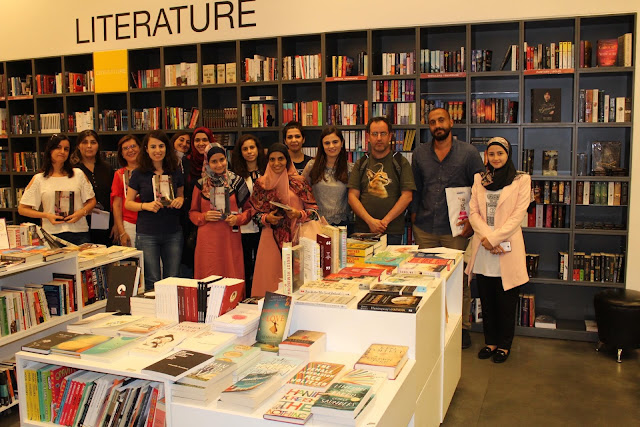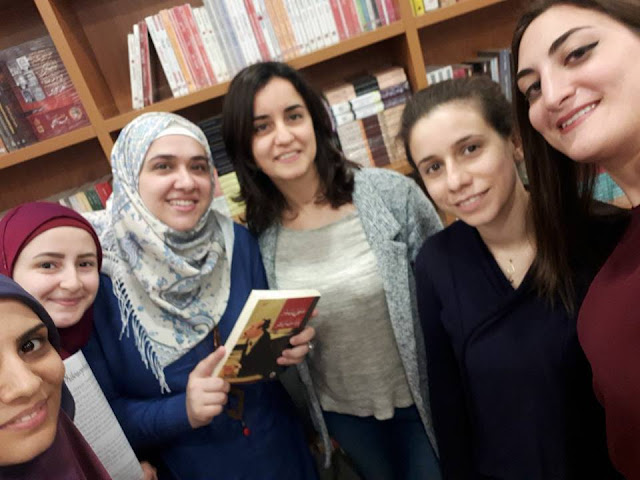Books & Needles April 28 , 2018: Paula, A Knit of Love, Hope, and Loss
Paula: A Knit of Love, Hope, and Loss
by Lubna Maaliki
How would you react if you knew that your child would be parting life any minute soon?
On April 28, 2018, Yarnoholics came together at Aaliya's Café to discuss the theme of motherhood at times of sickness and death. The discussion was weaved over cups of coffee, pieces of cake, and a stack of yarns and needles.
Paula is a 1994 memoir and tribute by Isabel Allende to her deceased daughter Paula Frías Allende, who fell into a porphyria-induced coma in 1991 and never recovered.
Isabel Allende wrote the memoir while tending to her daughter, Paula Frías Allende, who was in a coma arising from complications of porphyria. Allende started the book as a letter to Paula, explaining what she was missing so she would not be confused when she recovered. The novel includes accounts on both of Paula's treatment and of Allende's life, sometimes overlapping with the content of Allende's first novel, The House of the Spirits (1982). Paula died on December 6, 1992 and was survived by her husband, Ernesto Diaz, her mother Isabel, her brother Nicolás Frías, and other family members.
The discussion addressed several themes such as motherhood, self-evolvement, homeland, and childhood. One of the main questions discussed whether the memoir beautifully reflected motherhood and unconditional love, or was it an exaggeration in Allende’s affection to her daughter?
It was agreed that the memoir does reflect on motherhood and the unconditional giving and love mothers give to their children, however, most members also agreed that the author might have exaggerated at several times based on the fact that the author herself admitted exaggerating in several incidents while reflecting on her own upbringing and career life.
"My mind works like a storyteller. I want the highlights, the lowlights, the tension, and the tragic. That's what interests me."-- Isabel Allende
The members also discussed their favorite characters, quotes, and reflected on the impression the book left on them. Nadia, a mother of two, disclosed that the memoir came at a time where she was facing a loss of a friend and it helped her understand the dynamics of losing a loved one better.
While reading, Yarnoholics tried to imagine themselves in the shoes of Isabel and found the situation difficult to deal with. The members concluded that as her first nonfiction, Isabel did a good job translating her relationship with her daughter and what it means to be a mother. However, the members also noted that the theme of motherhood got muddled in the extensive historical and political events of Chile during Isabel’s childhood, teen years, and marriage.
Some discussion questions:
1- What did you find the most in this book: happiness or sadness? Hope or despair?
2- Where Do you love Allende more: in nonfiction or in fiction books? And why?
3- Allende rewrote Chile’s history and her own history in this book. Do you think she was objective especially when she narrated the events surrounding Salvador Allende’s life and political years?
4- Did you like how Allende went from her past to her present? Between her memories and her daughter’s coma ?
5- Would you hold that hard to someone in the same conditions as Paula?
6- Do you think Allende reacted to her daughter’s illness like any other woman? Or did you find her more sensitive and less realistic?
7- Do you think it was selfish of Allende to hold that hard to her daughter instead of letting her go?
8- What was your favorite character and why?
9- Allende wanted to give her daughter the past she might lost if she woke up. Do you think this book would have helped Paula after recovery? Or this book was a healing for Allende herself?
About the author: Isabel Allende has written over (20) books that have been translated into more than (35) languages and sold more than (67) million copies. During the course of her career, Allende has received numerous awards for her work including the Chilean National Prize for Literature (2010) and the Library of Congress Creative Achievement Award for Fiction (2010). In 2014, President Barack Obama presented Allende with the Presidential Medal of Freedom. She was married twice and has two children Nicolas and Paula who died from complications of a rare disease, porphyria, in 1992 at the age of (28). Allende established the Isabel Allende Foundation in Paula's honor. The foundation strives for economic and social justice for women.


Comments
Post a Comment